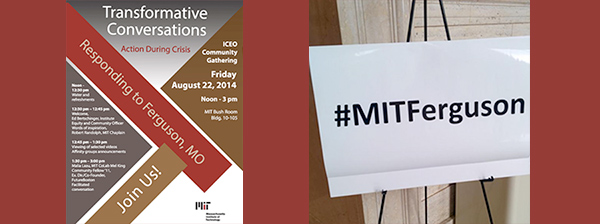
This summer rushed by for me like a video put on fast-forward until the nation pushed the pause button following the tragic August 9 killing of an unarmed teenager in Ferguson, Missouri. What followed was not quite an instant replay of previous deaths of African Americans, but the similarities with past tragedies are great enough to remind me that we’ve seen this play performed by other actors. The shooting of Michael Brown led to a series of crucial conversations across the country including at MIT.
Two weeks ago the Pew Research Center for the People and the Press issued a report finding stark racial differences in the reactions of white and black Americans to the shooting of Michael Brown. Of the White Americans who responded to the survey, 47% said that “Race is getting more attention than it deserves” while 37% said that “This case raises important issues about race.” For Black Americans, the respective percentages were 18% and 80%. These are, indeed, stark differences.
Within a week of the shooting, it was clear to me and my staff that our new office must stand visibly in support of African American students and employees, many of whom have faced subtle discrimination. On August 18, we began discussing the possible format of an event – a candelight vigil, march, or an organized community conversation. Under the leadership of ICEO Program Director Julian Green, we settled on the latter choice, and put together a program in just a few days.
On August 22, we held the ICEO Community Gathering: Transformative Conversations – Responding to Ferguson in the Bush Room at MIT. Fortunately, we had planned for an overflow audience; about 110 people showed up, including several parents of incoming MIT freshmen. The interest was much greater; many followed online at #MITFerguson.
The first speaker (after my brief opening remarks) was MIT Chaplain Robert Randolph. He noted that those who think we’ve reached a state of color-blindness haven’t been paying attention. Chaplain Randolph spoke about White Privilege, contrasting the danger experienced by black Americans with his own privilege as a white man. With privilege comes responsibility – at least, the responsibility of caring. This resonated for me with President Reif’s call to cultivate a caring community at MIT.
The keynote speaker was Malia Lazu, the MIT Community Innovators Lab (CoLab) Mel King Community Fellow ’11 and executive director and co-founder of Future Boston Alliance. She gave a powerful address about the need for love, disruption of the status quo, and taking responsibility for our communities. She challenged us to “take rage and alchemize it in the heart so that it comes out as love,” and to tell America that “black men’s lives are more than business as usual.” It was an inspiring rally to unite a community, not an exacerbation of division. Afterwards, we received many notes of appreciation from attendees who were surprised and pleased that MIT would organize such community conversations.
Since the event, I’ve been wondering what would have happened had the violence taken place not in Ferguson, Missouri but in Cambridge, Massachusetts. A little more than 15 months ago, about 5,000 MIT community members came to pay respects to slain MIT police officer Sean Collier. Love does not discriminate. Our police and our students of color are all beloved members of our community. Let us never forget that, and never forget to show respect and care while we can celebrate life.
Recommended reading: Becoming a White Ally to Black People in the Aftermath of the Michael Brown Murder by Janee Woods.
